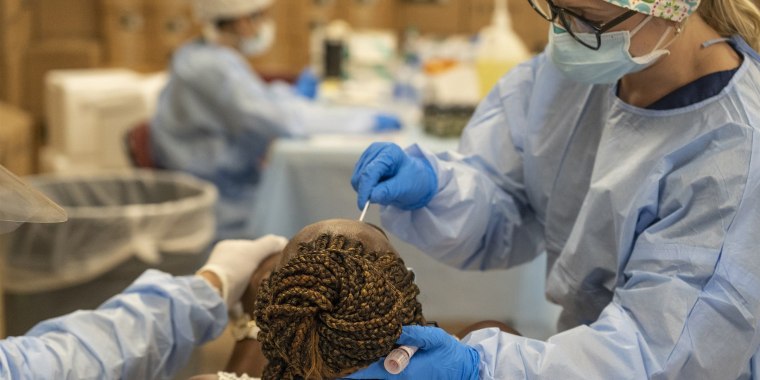The Food and Drug Administration on Friday granted LabCorp an emergency use authorization to test people with no symptoms for the coronavirus, the first time the agency has authorized such a test in asymptomatic individuals.
“FDA reissued the LabCorp COVID-19 RT-PCR Test EUA to expand use of the test to anyone, after the company provided scientific data showing the test’s ability to detect SARS-CoV-2 in a general, asymptomatic population,” the agency said in a statement.
Previously, to get a coronavirus diagnostic test, a person may have been asked to meet certain criteria, such as having symptoms of COVID-19 or close contact with a confirmed case.
In a statement to NBC News, a spokesperson for LabCorp said that the test has not changed, but that it has simply been granted authorization to expand its use to those without symptoms.
At the same time, labs across the U.S. are experiencing testing backlogs due to overwhelming demand from Americans, leading to delays in the turnaround time for results.
The change comes as growing evidence suggests certain similarities in COVID-19 cases with and without symptoms.
In a study posted Monday to the preprint server MedRxiv, researchers from the Broad Institute of MIT and Harvard University, found that the viral load — or the amount of virus in a person’s body — was similar in those who tested positive for the coronavirus both with symptoms and without symptoms. (Studies posted to preprint servers have not yet gone through peer review.)
The study looked at testing data from 32,299 residents and staff members from 366 skilled nursing facilities, nursing homes and assisted living facilities across Massachusetts.
Of the individuals who tested positive, 71% of residents and 93% of staff members didn’t have symptoms at the time of testing, and the viral load was similar in those with and without symptoms.
Because of this, the researchers suggested that polymerase chain reaction (PCR) tests that have been validated to test symptomatic individuals should also be effective in those without symptoms, such as the case with LabCorp. (The research was not related to the LabCorp test, however.)
PCR tests work by detecting tiny bits of the virus’s genetic material; the more virus present, the easier it is for the test to detect it. If levels of the virus are similar in people regardless of symptoms, the test should be equally effective.
Dr. Eric Topol, founder and director of the Scripps Research Translational Institute, told NBC News that the findings were “very important.”
The report “extends smaller previous ones as to the similarity in viral load in people without COVID-19 symptoms as compared with those having symptoms,” Topol, who was not involved with the new research, said.
However, he cautioned that, despite similarities in viral load, this study does not establish whether asymptomatic people spread the virus to the same degree as symptomatic people.
Peter Beernink, an associate professor of infectious disease at the University of California, San Francisco, said that this study was one of the more comprehensive studies on viral load that he has seen, given the number of cases and the random sampling involved in the data collection.
One of the bigger limitations of the study, however, was that it did not differentiate between asymptomatic and presymptomatic infections, he said. When people are presymptomatic, they go on to develop symptoms, even though they didn’t have them at the time they tested positive.
“They didn't have longitudinal samples from the same individuals — so they never knew whether somebody was going to become symptomatic,” said Beernick, who also wasn’t involved with the new research.
Still, the research shows the importance of doing widespread testing.
“It’s really the case that you don’t know who has the virus, and unless you do widespread testing, we can’t really make a large impact on decreasing” levels in the populations, Beernick said.
This story was originally published on NBC News.


